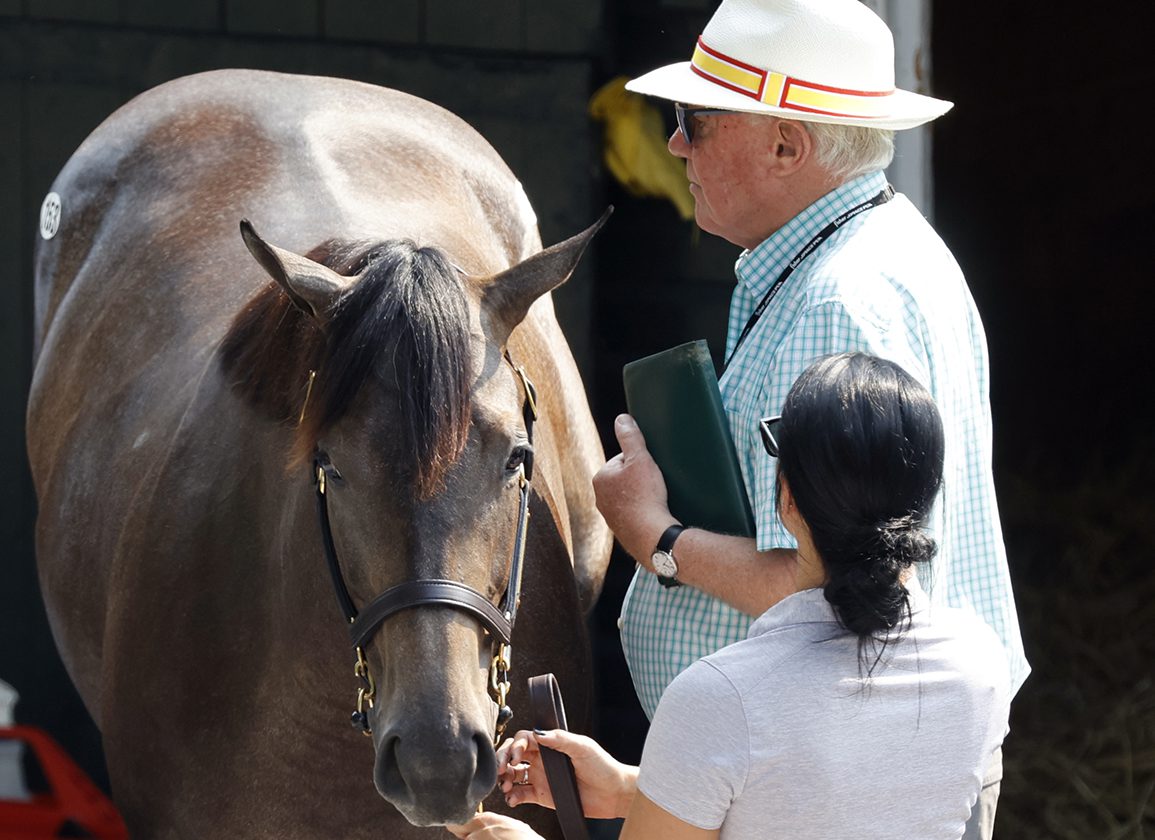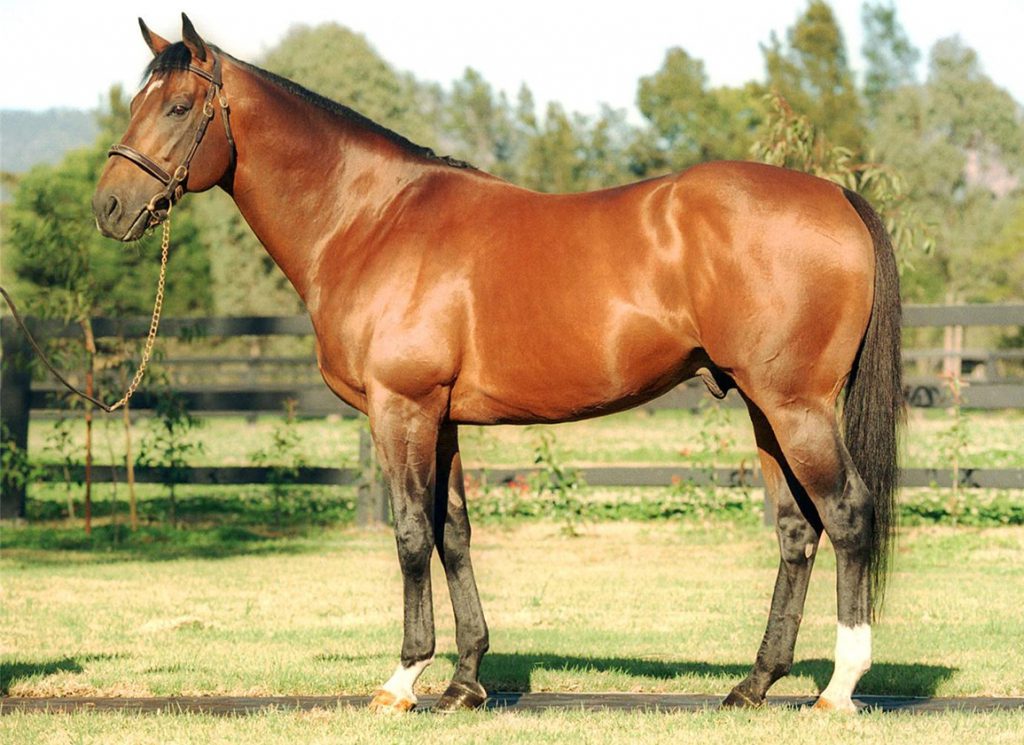By Chris McGrath
Even as the British Turf grieves a revered sovereign and, in the same person, its most cherished and indispensable servant, I hope you'll forgive me for instead reflecting on the loss, only the day before, of someone she would have loved to be typical of all her subjects: a horseman, and true countryman, who divided his time between the international bloodstock circuit and an old rectory in rural Yorkshire.
Whereas we knew that her great age was finally catching up with the monarch, James Delahooke's abrupt departure for a grouse moor in the sky has come as a ghastly shock. Returning to Lexington for the September Sale suddenly feels a dismally different prospect. Who, now, will tell us like it really is? Who else will entertain and educate us with that unerring, twin-edged blade of knowledge and mischief–both honed by a deep seasoning in the ups and downs of life, in general, and life with horses in particular.
His career as a bloodstock agent made James as familiar as any with those twin impostors, triumph and disaster. And the man who had come out the other side was not just a brilliant judge of horseflesh, but a no less acute observer of human nature.
James knew his mind, and how to speak his mind. And while he could be hilariously acerbic, in the end his sagacity was based–as it always must be–in a humility and compassion that he found wanting, on typically candid reflection, in his younger self.
(To listen to this story as a podcast, click the arrow below.)
He deplored the phonies and smooth talkers, many of whom thrived in the years of his unjust neglect. Being himself unfettered by any posture or pretense, however, he became a fount of insight and enthusiasm to refresh any who deserved to share them, whatever their age or station in life.
He was a fine raconteur albeit, as a compatriot who has accompanied him through airports, I'm not sure immigration officers were always so appreciative of this talent. But in a walk of life where too many say only what they imagine a rich person might want to hear, it became an instructive badge of merit to see those who did remain loyally in his camp; or, better yet, those who joined it when he was out of fashion.
Certainly it's unsurprising that James should have forged such a lasting bond with Arthur Hancock, another who knew both the solitariness and satisfactions of genius that has been separated, not without pain, from the heart of the Establishment.
James's judgement, ever priceless if sometimes inadequately prized, was reliably independent of the market herd. And he could, indeed, be memorably withering about the craven, venal or simply fatuous ways in which he saw others wasting their patrons' money.
In someday trying to replace the irreplaceable, we can trust those who have lost not just a friend but an inspired professional advisor to rely on the same instincts that served them so well, in first seeking James's services. You can almost hear his caustic bark of laughter at those “tyre-kickers”, as he called them, who may now amplify their unworthiness by crassly volunteering to fill his shoes. I remember him once discussing a couple of agents then enjoying conspicuous patronage. One, he declared, was a very nice person but “buying meatballs–and terribly expensive meatballs”; while the other, almost universally disparaged as an opportunist and adventurer, actually had an extremely good eye.
Both pronouncements were typical of James. The pity was that neither of these people could be truly described as rivals or peers. They were not strictly his rivals, because Bobby Flay was just about the only person smart enough to be giving James adequate resources to compete for the same stock. And they weren't peers because–well, because that was a distinction available to very few of his generation.
What an honor it was, to sit in his study and be shown his catalogue notes on Hip 154 at Saratoga in 1982. A single caveat: “Toes out slightly”. And two numbers scrawled: 1.6 and 350. The first was what he told Prince Khalid Abdullah he should expect to pay, because someone would surely have a million and a half for a daughter of His Majesty out of a Buckpasser half-sister to Northern Dancer. And the second was for the $350,000 actually required to buy the filly who became the dam of Danehill.
James had met the Prince three or four years previously, after dining with Guy Harwood in Deauville. When they asked for the bill, the waiter said it had been taken care of–indicating an elegant Arabian gentleman across the restaurant. This turned out to be the man who had relegated them to underbidders for a yearling earlier that day. Invited soon afterwards to sow the seeds of what has become one of the great programs in Turf history, within five years James had bought both the sire and dam of two Epsom Derby winners. He leaves an indelible legacy in the Juddmonte empire; in the breed itself; and, above all, in the knowledge and memories of so many friends.
James would not want misplaced sentiment in our bereavement, any more than a true horsewoman like Queen Elizabeth II would desire the final Classic of the British season to be postponed (as “a mark of respect”) when the trainers involved have fine-tuned their charges to the minute. Those of us who lament James's absence in Lexington this week know perfectly well that he would far rather we just raised a glass to his memory–and then, very shortly afterwards, another glass–before sharing a few of the stories that will long preserve the vivacity and sheer authenticity of his character.
Meanwhile I'm pretty sure he would hope that Arklow can grab the weekend headlines, as an 8-year-old son of Arch running 12 furlongs on grass. That way, perhaps, it won't just be his own example that encourages us to keep seeking the right stuff in the Thoroughbred.
I am grateful to know a few others of comparable stamp, from whom an approving email or text steels your resolve against any orthodoxy; while even a mild hint of dissent, equally, prompts you urgently to revisit the premises of your argument. But there's no denying that neither our business nor our community can easily absorb the sudden loss of a man like James.
Okay, perhaps so unconstrained a personality might not have made a monarch quite as successful as the one whose reign spanned almost his whole life. But I will certainly not be alone in missing the wit and wisdom guaranteed, from Yorkshire to Lexington, whenever King James was holding court.
Not a subscriber? Click here to sign up for the daily PDF or alerts.







